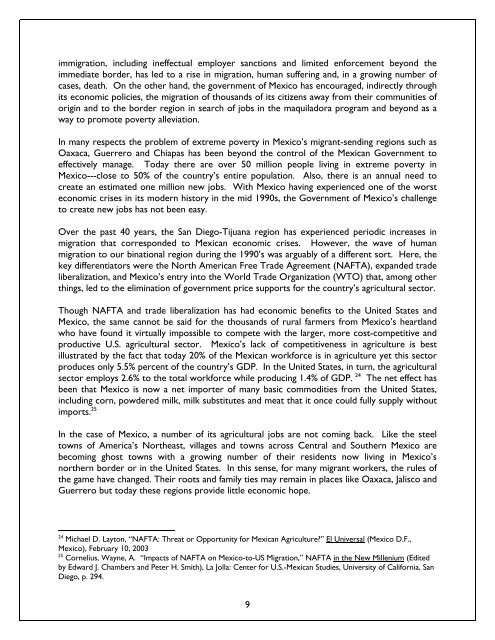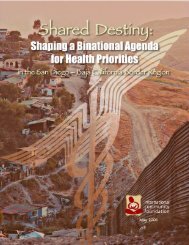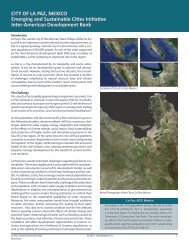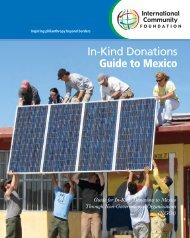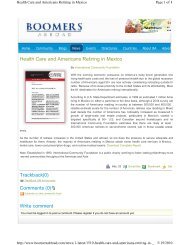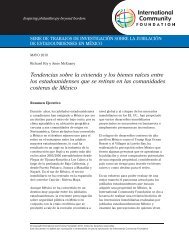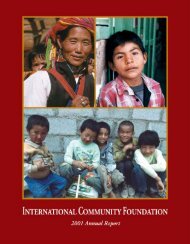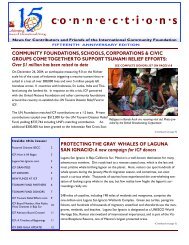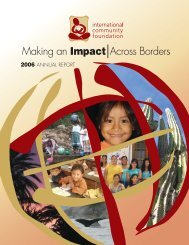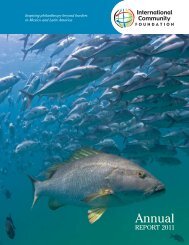Blurred Borders - International Community Foundation
Blurred Borders - International Community Foundation
Blurred Borders - International Community Foundation
Create successful ePaper yourself
Turn your PDF publications into a flip-book with our unique Google optimized e-Paper software.
immigration, including ineffectual employer sanctions and limited enforcement beyond the<br />
immediate border, has led to a rise in migration, human suffering and, in a growing number of<br />
cases, death. On the other hand, the government of Mexico has encouraged, indirectly through<br />
its economic policies, the migration of thousands of its citizens away from their communities of<br />
origin and to the border region in search of jobs in the maquiladora program and beyond as a<br />
way to promote poverty alleviation.<br />
In many respects the problem of extreme poverty in Mexico’s migrant-sending regions such as<br />
Oaxaca, Guerrero and Chiapas has been beyond the control of the Mexican Government to<br />
effectively manage. Today there are over 50 million people living in extreme poverty in<br />
Mexico---close to 50% of the country’s entire population. Also, there is an annual need to<br />
create an estimated one million new jobs. With Mexico having experienced one of the worst<br />
economic crises in its modern history in the mid 1990s, the Government of Mexico’s challenge<br />
to create new jobs has not been easy.<br />
Over the past 40 years, the San Diego-Tijuana region has experienced periodic increases in<br />
migration that corresponded to Mexican economic crises. However, the wave of human<br />
migration to our binational region during the 1990’s was arguably of a different sort. Here, the<br />
key differentiators were the North American Free Trade Agreement (NAFTA), expanded trade<br />
liberalization, and Mexico’s entry into the World Trade Organization (WTO) that, among other<br />
things, led to the elimination of government price supports for the country’s agricultural sector.<br />
Though NAFTA and trade liberalization has had economic benefits to the United States and<br />
Mexico, the same cannot be said for the thousands of rural farmers from Mexico’s heartland<br />
who have found it virtually impossible to compete with the larger, more cost-competitive and<br />
productive U.S. agricultural sector. Mexico’s lack of competitiveness in agriculture is best<br />
illustrated by the fact that today 20% of the Mexican workforce is in agriculture yet this sector<br />
produces only 5.5% percent of the country’s GDP. In the United States, in turn, the agricultural<br />
sector employs 2.6% to the total workforce while producing 1.4% of GDP. 24 The net effect has<br />
been that Mexico is now a net importer of many basic commodities from the United States,<br />
including corn, powdered milk, milk substitutes and meat that it once could fully supply without<br />
imports. 25<br />
In the case of Mexico, a number of its agricultural jobs are not coming back. Like the steel<br />
towns of America’s Northeast, villages and towns across Central and Southern Mexico are<br />
becoming ghost towns with a growing number of their residents now living in Mexico’s<br />
northern border or in the United States. In this sense, for many migrant workers, the rules of<br />
the game have changed. Their roots and family ties may remain in places like Oaxaca, Jalisco and<br />
Guerrero but today these regions provide little economic hope.<br />
24<br />
Michael D. Layton, “NAFTA: Threat or Opportunity for Mexican Agriculture?” El Universal (Mexico D.F.,<br />
Mexico), February 10, 2003<br />
25<br />
Cornelius, Wayne, A. “Impacts of NAFTA on Mexico-to-US Migration,” NAFTA in the New Millenium (Edited<br />
by Edward J. Chambers and Peter H. Smith), La Jolla: Center for U.S.-Mexican Studies, University of California, San<br />
Diego, p. 294.<br />
9


